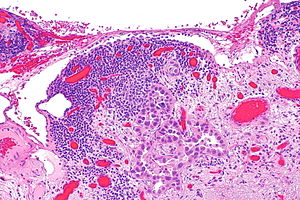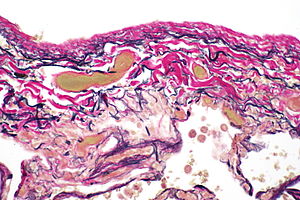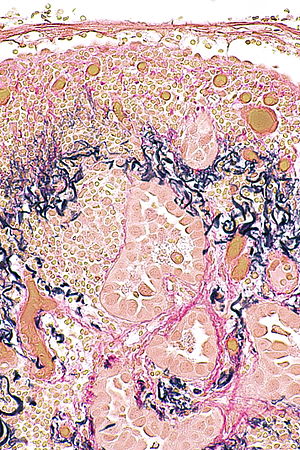Difference between revisions of "Pleural invasion"
Jump to navigation
Jump to search



| Line 26: | Line 26: | ||
!Tumour stage ([[TNM staging]]) | !Tumour stage ([[TNM staging]]) | ||
|- | |- | ||
|PL0 | |PL0 † | ||
|tumour confined to lung, not through elastic layer | |tumour confined to lung, not through elastic layer | ||
|T(any) | |T(any) | ||
|- | |- | ||
|PL1 | |PL1 † | ||
|tumour beyond (external) elastic layer of the visercal pleura, not at pleural surface | |tumour beyond (external) elastic layer of the visercal pleura, not at pleural surface | ||
|at least T2 | |at least T2 ‡ | ||
|- | |- | ||
|PL2 | |PL2 | ||
| Line 43: | Line 43: | ||
|} | |} | ||
Notes: | |||
*The interface between PL0 and PL1 is the most challenging. Use of an elastic stain is recommend when there is uncertainty.<ref name=pmid23020722/> | *† The interface between PL0 and PL1 is the most challenging. Use of an elastic stain is recommend when there is uncertainty.<ref name=pmid23020722/> | ||
*The up-staging of small tumours is not completely without controversy; there is data for lung adenocarcinomas less than 2 cm that suggests VPI is not an outcome predictor.<ref name=pmid23807749>{{Cite journal | last1 = Nitadori | first1 = J. | last2 = Colovos | first2 = C. | last3 = Kadota | first3 = K. | last4 = Sima | first4 = CS. | last5 = Sarkaria | first5 = IS. | last6 = Rizk | first6 = NP. | last7 = Rusch | first7 = VW. | last8 = Travis | first8 = WD. | last9 = Adusumilli | first9 = PS. | title = Visceral pleural invasion does not affect recurrence or overall survival among patients with lung adenocarcinoma ≤ 2 cm: a proposal to reclassify T1 lung adenocarcinoma. | journal = Chest | volume = 144 | issue = 5 | pages = 1622-31 | month = Nov | year = 2013 | doi = 10.1378/chest.13-0394 | PMID = 23807749 }}</ref> | *‡ The up-staging of small tumours is not completely without controversy; there is data for lung adenocarcinomas less than 2 cm that suggests VPI is not an outcome predictor.<ref name=pmid23807749>{{Cite journal | last1 = Nitadori | first1 = J. | last2 = Colovos | first2 = C. | last3 = Kadota | first3 = K. | last4 = Sima | first4 = CS. | last5 = Sarkaria | first5 = IS. | last6 = Rizk | first6 = NP. | last7 = Rusch | first7 = VW. | last8 = Travis | first8 = WD. | last9 = Adusumilli | first9 = PS. | title = Visceral pleural invasion does not affect recurrence or overall survival among patients with lung adenocarcinoma ≤ 2 cm: a proposal to reclassify T1 lung adenocarcinoma. | journal = Chest | volume = 144 | issue = 5 | pages = 1622-31 | month = Nov | year = 2013 | doi = 10.1378/chest.13-0394 | PMID = 23807749 }}</ref> | ||
==Gross== | ==Gross== | ||
Revision as of 03:38, 23 October 2015

Visceral pleural invasion. H&E stain. (WC)
Pleural invasion is the presence of tumour in the pleura. Pleural invasion is considered a poor prognosticator in lung cancer,[1][2] and important in determining the tumour stage in lung cancer staging.
General

Lung visceral pleura. Miller stain. (WC)
The visceral pleura is the pleura that covers the lung; tumour invasion into it is known as visceral pleural invasion (abbreviated VPI). The parietal pleural covers the chest wall.
The visceral pleura has two elastic layers:[3]
- External elastic layer.
- Usually thick/prominent.
- Important for staging.
- Internal elastic layer.
- Thin - may be difficult to see.
- Irrelevant for staging.
Images - normal pleural
Modified Hammar classification
Pleural invasion can be subgrouped as follows:[1]
| Category | Description | Tumour stage (TNM staging) |
|---|---|---|
| PL0 † | tumour confined to lung, not through elastic layer | T(any) |
| PL1 † | tumour beyond (external) elastic layer of the visercal pleura, not at pleural surface | at least T2 ‡ |
| PL2 | tumour at surface of pleura, not in parietal pleura | at least T2 |
| PL3 | tumour within parietal pleura and visceral pleura | at least T3 |
Notes:
- † The interface between PL0 and PL1 is the most challenging. Use of an elastic stain is recommend when there is uncertainty.[3]
- ‡ The up-staging of small tumours is not completely without controversy; there is data for lung adenocarcinomas less than 2 cm that suggests VPI is not an outcome predictor.[4]
Gross
- Tumour close to visceral pleura, e.g. <1 mm - high probability of VPI.
- Puckering of the visceral pleura overlying the tumour - suspicious for VPI.
Microscopic
Features - for PL1:
- Must be through the external elastic layer.[3]
Note:
- Tumour trapped within the (external) elastic layer is still PL0.[3]
Images
Stains

Visceral pleural invasion. Miller stain. (WC)
- Elastic stain (e.g. Miller, elastic trichrome, Verhoeff-van Gieson) - demonstrating tumour superficial to the (external) elastica.
Images
See also
References
- ↑ 1.0 1.1 Travis, WD.; Brambilla, E.; Rami-Porta, R.; Vallières, E.; Tsuboi, M.; Rusch, V.; Goldstraw, P. (Dec 2008). "Visceral pleural invasion: pathologic criteria and use of elastic stains: proposal for the 7th edition of the TNM classification for lung cancer.". J Thorac Oncol 3 (12): 1384-90. doi:10.1097/JTO.0b013e31818e0d9f. PMID 19057261.
- ↑ Shimizu, K.; Yoshida, J.; Nagai, K.; Nishimura, M.; Ishii, G.; Morishita, Y.; Nishiwaki, Y. (Jul 2005). "Visceral pleural invasion is an invasive and aggressive indicator of non-small cell lung cancer.". J Thorac Cardiovasc Surg 130 (1): 160-5. doi:10.1016/j.jtcvs.2004.11.021. PMID 15999057.
- ↑ 3.0 3.1 3.2 3.3 Dacic, S. (Oct 2012). "Dilemmas in lung cancer staging.". Arch Pathol Lab Med 136 (10): 1194-7. doi:10.5858/arpa.2012-0282-CC. PMID 23020722.
- ↑ Nitadori, J.; Colovos, C.; Kadota, K.; Sima, CS.; Sarkaria, IS.; Rizk, NP.; Rusch, VW.; Travis, WD. et al. (Nov 2013). "Visceral pleural invasion does not affect recurrence or overall survival among patients with lung adenocarcinoma ≤ 2 cm: a proposal to reclassify T1 lung adenocarcinoma.". Chest 144 (5): 1622-31. doi:10.1378/chest.13-0394. PMID 23807749.












